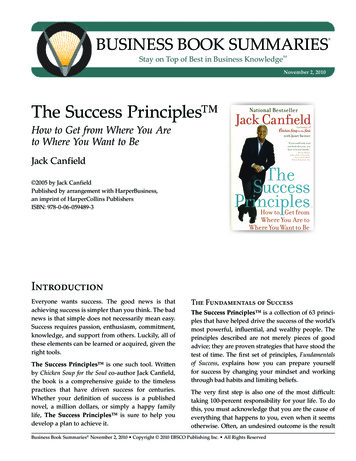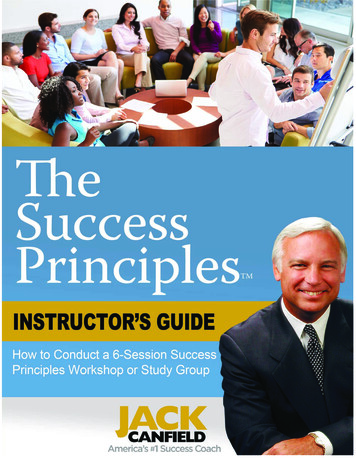
Transcription
BUSINESS BOOK SUMMARIES Stay on Top of Best in Business KnowledgeSMNovember 2, 2010The Success Principles How to Get from Where You Areto Where You Want to BeJack Canfield 2005 by Jack CanfieldPublished by arrangement with HarperBusiness,an imprint of HarperCollins PublishersISBN: 978-0-06-059489-3IntroductionEveryone wants success. The good news is thatachieving success is simpler than you think. The badnews is that simple does not necessarily mean easy.Success requires passion, enthusiasm, commitment,knowledge, and support from others. Luckily, all ofthese elements can be learned or acquired, given theright tools.The Success Principles is one such tool. Writtenby Chicken Soup for the Soul co-author Jack Canfield,the book is a comprehensive guide to the timelesspractices that have driven success for centuries.Whether your definition of success is a publishednovel, a million dollars, or simply a happy familylife, The Success Principles is sure to help youdevelop a plan to achieve it.The Fundamentals of SuccessThe Success Principles is a collection of 63 principles that have helped drive the success of the world’smost powerful, influential, and wealthy people. Theprinciples described are not merely pieces of goodadvice; they are proven strategies that have stood thetest of time. The first set of principles, Fundamentalsof Success, explains how you can prepare yourselffor success by changing your mindset and workingthrough bad habits and limiting beliefs.The very first step is also one of the most difficult:taking 100-percent responsibility for your life. To dothis, you must acknowledge that you are the cause ofeverything that happens to you, even when it seemsotherwise. Often, an undesired outcome is the resultBusiness Book Summaries November 2, 2010 Copyright 2010 EBSCO Publishing Inc. All Rights Reserved
The Success Principles of your response to a certain event, not the event itself.Therefore, if you do not like your outcomes, youmust learn to change your responses. Successfulpeople see every failure as a new opportunity foreven greater success. To accept 100-percent responsibility for your life, you must also decide to stopblaming others and stop complaining.Identifying your purpose in life is another early stepon the road to success. Without a purpose, peopletend to wander and accomplish very little. If you donot yet know your purpose in life, try to imagine ajob you would love so much that you would do it forfree. Your inner guidance system will help you in theidentification process, as you will be able to “feel”when you are on the right track as well as when youare veering off it. Once you have identified your life’spurpose, write it down and read it aloud every day,ideally in the morning.After you decide why you are here, you must decidewhat you want. This is the stage where you mustdefine what success means to you personally. Whatdo you want to accomplish? What possessions wouldyou like to have? A key characteristic of successfulpeople is that they do not settle for less than exactlywhat they want. Being clear about what you wantmay make you uncomfortable at first, but it will bea critical step in determining how to get it. One ofthe easiest ways to clarify your goals is to write themdown. Try making lists of the 30 things you want todo, the 30 things you want to have, and the 30 thingsyou want to be before you die.Being successful requires that you make the choiceto believe in yourself; this is an attitude that must bedeveloped over time. You must eliminate the words “Ican’t” from your vocabulary, and begin to replace allnegative thoughts with positive self-affirmations. It isimportant to note that while continuous education isvital to success, you do not need a college degree to besuccessful. Many of the world’s most powerful people– such as Larry Ellison, Dick Cheney, and Bill Gates– dropped out of college; some even dropped out ofhigh school. Successful people know that they can startfrom anywhere and ultimately become successful.Truly successful people know how to set goals. Propergoals are based on two criteria: the what and the when.You must decide some measurable quantity to reach,Jack CanfieldKey ConceptsTo be successful, you must identify both whereyou are and where you want to be. Here are sometips to guide you on the journey to success: A proper goal requires a measurable quantity to reach (the “what”) and a specific timeframe in which to reach it (the “when”). Visualization is a powerful practice thatallows you to prepare for an experience andidentify your true goals and ambitions. You can jump-start success by acting as ifyou already have it. Behaving and dressinglike a successful person will boost your selfesteem and reveal opportunities for success. In the workplace, focus on your primarystrength and delegate all nonessential tasksto others. Redefine your time by scheduling FocusDays, Buffer Days, and Free Days each week. Practice the Rule of Five: take five steps towardachieving your goal every single day. Show uncommon appreciation throughoutyour life, using a combination of auditory,visual, and kinesthetic rewards.g g g gInformation about the author and es.comInformation about this book and other business titles:www.harpercollins.comRelated summaries in the BBS Library:MindsetThe New Psychology of SuccessBy Carol S. DweckWork with Passion in Midlife and BeyondReach Your Full Potential & Makethe Money You NeedBy Nancy AndersonBusiness Book Summaries November 2, 2010 Copyright 2010 EBSCO Publishing Inc. All Rights ReservedPage 2
The Success Principles as well as a specific time by which you plan to reachit. Writing down your goals is essential. Try creatinga list of 101 things you would like to achieve in yourlife. You will most likely be surprised by how manyyou achieve over the next few years. Make sure youinclude a few “breakthrough goals”: goals that wouldcompletely change your world for the better, such asopening your own business, publishing a book, orwinning a gold medal in the Olympics. The higheryou aim, the better.Jack CanfieldTo be successful, you must learn to get out of yourcomfort zone on a regular basis. A great way to dothis is to fill your subconscious with images andthoughts of your ideal life through a process calledvisualization. When you visualize yourself in a certain scenario, the brain functions as if it were reallyin that scenario, helping you prepare for it and growaccustomed to it. Visualize yourself at your ideallevel of success. What kind of house will you live in?What will you look like? How will you act? Whenyou visualize success, you begin to see opportunities all around you that can put you on the path tothe life you want. Some experts have suggested thatone hour of visualization is worth seven hours ofphysical effort!After you decide on your goals, begin working on oneby breaking it into steps. There are several ways todo this, such as consulting others who have alreadyachieved the goal, purchasing a book that describesthe process, or assessing theproblem yourself, beginning Remember, the proper order of things is to start now and be whowith the end and movingyou want to be, then do the actions that go along with being thatbackward. Once you havedecided on a process, create a person, and soon you will find that you easily have everythingdaily to-do list describing the you want in life – health, wealth, and fulfilling relationships.steps you will take each day tocomplete the goal in a reasonable period of time. It isOne of the most powerful ways to jump-start sucespecially helpful to plan your day the night before.cess is to act as if you already have it. Even withoutOften, it is most effective to begin with the mostwealth and power, you can begin living your idealimportant or most difficult step.life by behaving the way successful people do andby associating yourself with other successful people.One of the best things about living in an informationThis prepares you for success and creates the selfrich society is that success leaves clues. If you want toconfidence needed to pounce on opportunities anddo something, chances are someone has already doneform powerful relationships.it. Finding a mentor or coach can be a great way toobtain feedback at each stage of the process, and toSuccessful people know that while preparation andavoid the mistakes they made. If a long-term mentorgoal-setting are critical steps, nothing happens untilship is possible, ask if you can shadow them for a day,they take action. Most people are afraid of takingor participate in a volunteer or internship program.action out of fear that they will fail. Successful people,on the other hand, see failure as an important part ofthe learning process. They feel the same fear as everyone else, yet they act anyway.About the AuthorJack Canfield, America’s Success Coach, isthe co-creator of the Chicken Soup for the Soulseries, which includes 40 New York Times bestsellers, and co-author of You’ve GOT to ReadThis Book! An internationally renowned corporate trainer, keynote speaker, and popularradio and TV talk show guest, he lives in SantaBarbara, California.To be successful, you must be able to deal with feareffectively. Modern psychology teaches us that mostfear is self-created; people often frighten themselvesby imagining the worst possible scenario. When confronting fear, ask yourself what you are imaginingand replace the thought with its positive opposite.For instance, if you are afraid of asking for a raise forfear of being turned down, imagine instead your bosshappily fulfilling your request.Business Book Summaries November 2, 2010 Copyright 2010 EBSCO Publishing Inc. All Rights ReservedPage 3
The Success Principles Jack CanfieldA downside to success is that it always has a price,which you must be willing to pay. Sometimes, successrequires that you focus on one thing and put the rest ofyour life on hold. Often, it requires extra training, practice, discipline, or sacrifice. Almost always, the price ofsuccess includes a willingness to step outside of yourcomfort zone. To be successful, you must do whateverit takes to get the job done, without making excuses.When facing a particularly difficult challenge, it isimportant to remember that you will pass through anawkward phase. You must be willing to look foolish inthe early stages of progress, much like when you learnhow to ride a bike or play a musical instrument. Occasionally, you may discover that the price of success ishigher than you are willing to pay – for example, if itwould create a strain on your health or relationships.These types of decisions require that you know yourself well and understand how the road to success willaffect you both physically and emotionally.The fear of rejection is an issue that permeates allaspects of personal and work life. Successful peopleaccept rejection as part of the process; they do not takeit personally, and they are not discouraged by it. Manyof the world’s most successful ideas were realizedonly after a long string of rejections; if their creatorshad given up after a few rejections, they would havenever happened!To overcome your fear of asking, try making a listof things you would like to ask for, in the followingseven categories: financial, career, recreation, health,relationships, personal projects, and your community.For each item, list the potential benefits of asking.Then, list the potential benefits of not asking.Successful people tend to exceed expectations andgive more than they promise. If you make this a habit,you will be more likely to receive promotions, raises,bonuses, and other extra benefits. When you go theextra mile, you will be the first to be hired and thelast to be fired. You will make your company moreAs soon as you take action, you will begin to receivefeedback, both verbal and nonverbal. When you receivefeedback, you have two choices: ignore it or respondto it. Successful people see feedback as an invaluabletool, allowing them to improve their product andgain insight about the people that might be using it.Feedback can be positive or negative, and both typesare equally useful. Most people will not give feedbackvoluntarily; it is up to you to ask for it. To obtain helpful feedback in a variety of situations, try asking thissimple question: “On a scale of one toten, how would you rate the quality ofThe one thing that seems to separate winners from losersour relationship (service/product) overmore than anything else is that winners take action. They the last week (month/quarter)?” If thesimply get up and do what has to be done. Once they have answer is anything less than a ten, askthe person, “What would it take to makedeveloped a plan, they start. They get into motion.it a ten?” Simply knowing a person isOne of the easiest ways to obtain the things you wantunhappy is not enough; you must learn exactly what itis to ask for them. Most people are afraid to ask outwill take to satisfy them completely. Not all feedback isof fear of rejection, or fear of looking foolish, needy,accurate (you must carefully consider the source), butor stupid. When you do not ask, however, you rejectyou can be sure that if several people tell you the sameyourself before anyone else has a chance to. If you askthing, there is probably some degree of truth in it. Lookand are rejected, you are no worse off than when youfor patterns and trends in your feedback.started. You can learn to ask for things properly byA great way to get the ball rolling on any project is tofollowing these guidelines:practice the Rule of Five: Commit to doing five things Be clear and specific about what you want.a day that will move you closer to your goal. One consultant compares the Rule of Five to cutting down a Ask as if you expect to get it.tree: “If you would go every day to a very large tree Assume you are allowed to get it.and take five swings at it with a very sharp ax, eventually, no matter how large the tree, it would have to Ask someone who can give it to you.come down.” This is an important lesson on the jour Ask repeatedly, if necessary.ney to success.Business Book Summaries November 2, 2010 Copyright 2010 EBSCO Publishing Inc. All Rights ReservedPage 4
The Success Principles money, and you will feel more satisfied at the end ofthe day. If you sell something, try including extra services or perks, such as free car washes with a new car,or a bottle of champagne with a new house. If you arean office employee, always be the first to volunteer forextra responsibilities without demanding extra pay.Transform Yourself for SuccessThe second set of principles, Transform Yourself for Success, includes several ways to change your behaviorsand sustain success. One of the first changes you mustmake is to begin surrounding yourself with other successful people. You must also begin to eliminate thenegative relationships having a toxic effect on yourlife. Try making a list of everyone you interact with ona regular basis; put a plus sign next to the people whohave a positive effect on you, and put a minus sign nextto those you consider negative. By doing this, you maybegin to see patterns – for instance, you might find thatmost of the negativity is focused in your workplace,among your friends, or even among your family.Jack CanfieldSuccess also requires that you transform the wayyou talk to yourself throughout the day. Studies haveshown that people talk to themselves upwards of50,000 times a day, making intrapersonal communication a critical driver of both good and bad behaviors.Most harmful self-talk falls under one of the following categories: Catastrophic predicting – Predicting the worstpossible scenario and acting as if it were a certainty. Mind-reading – Believing you know what othersare thinking about you, even though the personhas not told you. Guilt-tripping – Thinking of words such as“should,” “must,” or “ought to,” creating a subconscious resistance to accomplishing the task. Labeling – Attaching negative labels or stereotypes to yourself or to someone else.Another important practice thatChange is inevitable. At this very moment, for instance, yourshould be used on a daily basis isto acknowledge your successes body and cells are changing. And though you can resist thatthroughout the day, as well as the change and potentially be swept away by it, you can alsomajor successes in your past. A choose to cooperate with it, adapt to it, and benefit from it.good exercise is to divide your lifeinto three equal time periods (for example, if you areAnother way to transform yourself for success over60, divide your life into 20-year periods) and list yourtime is to develop four new successful habits a year.three most important achievements in each of theseScientists have suggested that over 90 percent of ourperiods. Additionally, you should log your successesbehavior is habitual, making good habits a powerfulby writing down five things you achieved duringtool for achieving success. If you work on four neweach day, ideally right before you go to bed. This willhabits a year (only one per quarter), in only five yearsgive you the self-esteem you need to create successyou will have 20 new behaviors that will boost sucthroughout the next day.cess, without you even thinking about it.To be successful, you must learn to embrace change.There are two types of change: cyclical change andstructural change. Most people accept cyclical change,such as the up-and-down nature of the stock market,or the predictable changes in weather that come witheach new season. Structural change, however, is moredifficult to predict, and more difficult to deal with.Structural change includes innovations that alter howwe work and live; after a structural change, there isoften no going back. Embracing change means becoming aware of the trends that lead to structural changeand preparing for them.Successful people gain an advantage over others byincreasing their knowledge. There are several easyways to continue learning while on a busy schedule. First, replace an hour of TV time with an hour ofreading time every day. This creates 365 extra hoursper year – over nine additional 40-hour work weeks!If you read just one book a week, you will read 520books in 10 years – enough to put you into the top1 percent of experts in your field. Biographies aboutsuccessful people are often great ways to learn behaviors that will create success in your own life.Business Book Summaries November 2, 2010 Copyright 2010 EBSCO Publishing Inc. All Rights ReservedPage 5
The Success Principles In order to sustain success, you must learn to workwith both passion and enthusiasm. To do this, youmust eliminate distractions so you can spend yourtime doing the things you love to do. If your passionbegins to wane, try to reconnect with your originalpurpose and motivation by asking yourself aboutthe underlying reasons for your behavior. When yourediscover why you want to do something, it will bemuch easier to discover how. If you are not skilledenough to work in a field you are passionate about,educate yourself until you are. When you express yourpassion through your work, others become attractedto you and help you achieve your dreams and goals.Jack Canfieldthe case of a real emergency. Free Days extend frommidnight to midnight, and allow you to rest and returnto work with renewed enthusiasm and vigor. Notably,more than one-fourth of all Americans do not use anyof their vacation time; this is often the cause of poorproductivity due to high stress at work.A good way to start building your team is to find amentor. Begin by determining what you want out ofa mentor, and then select a few possible candidates.Do your homework by researching each candidateand preparing a list of topics you would like to coverin your introductory conversation. When you believeyou have found a suitable mentor,ask them if they would like to adviseIn life the spoils of victory go to those who make a 100%you and help you achieve your goals.commitment to the outcome; to those who have a ‘no matFinally, be prepared to act on yourter what it takes’ attitude. They give it their all; they putmentor’s advice, as he or she will notappreciate having their time wasted.everything they have into getting their desired result.Build Your Success TeamThe third set of principles, Build Your Success Team,includes advice on how to create and manage a smallgroup of professionals who will help you achieve yourgoals. The first step in building an effective team is tofocus on your primary strength, or your core genius.The best way to sustain this focus is to delegate allnonessential tasks to others. Many leaders are hesitant to delegate relentlessly, worrying that employeeswill think they are lazy or incompetent. In reality, themost successful leaders are those who place work inthe hands of those who will complete it passionatelyand enthusiastically, no matter how small the job.Another preparatory step in building your successteam is to redefine your time; the Entrepreneurial TimeSystem is an effective way of doing this. This systemplaces each day into one of three categories: Focus Days,Buffer Days, and Free Days. During a Focus Day, youspend 80 percent of your time operating in your coregenius, doing the things that yield the highest returnon the time you invest. Buffer Days are days spentpreparing for a Focus Day. Buffer Days may includelearning a new skill, locating resources, training yoursupport team, or delegating tasks to others. The purpose of Buffer Days is to make sure that Focus Days areas productive as possible. Free Days are days in whichyou are not available to your staff or clients, except inWith the help of your mentor, createyour success team by selecting five or six highly successful professionals from a variety of backgroundsand areas of expertise. Ideally, this team should meetevery week or every other week, for one to two hours.During this meeting, each member discusses theirrecent roadblocks or successes, and the other membersweigh in with advice or considerations. This type ofmeeting will allow you to gain perspective on complexsituations and also discuss ideas from outside yourindustry that could be adapted to solve your problems.Create Successful RelationshipsThe fourth set of principles, Create Successful Relationships, describes several ways to build and sustainthe personal relationships needed to achieve yourgoals. The first step in building such relationshipsis listening rather than just hearing. While hearing issimply receiving communication, listening is theart of paying thoughtful attention with the goal ofunderstanding the complete message. The completemessage involves more than the words being spoken;it also includes body language, eye contact, and subtleinflections of the voice.Many people spend a great deal of time trying to beinteresting rather than being interested in the livesof others. Being truly interested in others is the bestway to establish a rapport with them and win themBusiness Book Summaries November 2, 2010 Copyright 2010 EBSCO Publishing Inc. All Rights ReservedPage 6
The Success Principles Jack Canfieldover. This is because active listening allows you todetermine what makes people happy or unhappy– information you can store and act upon when theopportunity arises.Effective relationships require that you tell the truthoften, and quickly. Telling the truth can sometimesmake you uncomfortable, as it may hurt someone’sfeeling or provoke their anger. However, without thetruth, people are unable to deal with problems realistically. Acknowledge that there is never a “perfecttime” to tell the truth; simply do it as soon as possible, face the consequences, andmove on.There are three types of appreciation that can be usedby leaders in the workplace: auditory, visual, and kinesthetic. Each employee is especially motivated byone of the three. Auditory-type employees need tobe appreciated through face-to-face conversation andwords of encouragement. Visual-type employees aremore motivated by letters, cards, flowers, plaques, orcertificates. Kinesthetic types are motivated by touchor physical experiences, such as a pat on the back, ahug, or taking them out to dinner or to a show. Whenin doubt, use a combination of all three types, andobserve which type the employee responds to most.When you realize how important your integrity and self-Successful people are the masters esteem really are, you will stop making casual agreementsof their words – that is, they speakjust to get someone off your back. You won’t sell your selfdeliberately and use words thatwill build self-esteem and con- esteem for a little bit of momentary approval.fidence. They also use words ofTo sustain relationships, you must also keep yourinclusion rather than of separation, acceptance ratheragreements. In the past, giving one’s word wasthan rejection, and tolerance rather than prejudice.considered a sacred bond; today, employees andYou must eliminate lying from all aspects of your life,supervisors remain suspicious even after they createas it is based on low self-esteem. When you lie, youa written agreement. You must commit to keeping alldo so because you feel your abilities are not enoughyour promises, without exception. For many leaders,to get what you want. You must also work hard tothis often means making fewer promises. Some tipseliminate gossip, as it says a great deal about you andfor making and keeping agreements are:gives off an air of judgment and negativity. Make only agreements that you intend to keep – DoMany people create conflict by assuming they knownot make agreements just because you are lookwhat others are thinking or feeling; you can avoiding for approval; trust your intuition.these types of problems simply by asking. Often,people are afraid to ask others how they feel because Write down all the agreements you make – This canthey are afraid of hearing bad news. Again, however,help you keep track of agreements and remindthe truth is necessary to face problems in the contextyou to honor them in a timely manner.of reality. When in doubt, just say, “You don’t look Communicate broken agreements at the first approprihappy. What’s going on?” Many times, you will findate time – This demonstrates respect for the otherthat their emotions are not directed toward you at all.person’s time and needs, and allows them time toHighly successful people practice appreciation atmake other arrangements.an extraordinary level. A recent study showed that Say “no” more often – Give yourself time to think88 percent of people leaving major companies feltover an agreement. If it is unrealistic, respect thethey were not being acknowledged for their work.other person by declining.Another study showed that appreciation is employSuccess and Moneyees’ number-one motivator at work; interestingly,appreciation ranks number eight on the list of thingsThe fifth set of principles, Success and Money, includessupervisors believe motivate employees. This misadvice on how to make and keep the finances youmatch illustrates the desperate need to increaseneed to achieve your goals. First, you must identifyappreciation at work.your limiting beliefs about money. Most people areBusiness Book Summaries November 2, 2010 Copyright 2010 EBSCO Publishing Inc. All Rights ReservedPage 7
The Success Principles Jack Canfieldfamiliar with phrases such as “money is the root ofall evil,” and “money doesn’t grow on trees”; whilethese phrases are not meant to be taken seriously, theydo say something about the public’s perception ofmoney. You must believe you can make money doingwhat you love, and you must also move past the negative connotations of wealth.If you want to be wealthy, you must first determinewhat wealth means to you. Figure out your own networth (this can be done with the help of an advisor, orwith a free online calculator) and then determine howmuch money you will need to live the life you want.For many people, this means determining how muchretirement will cost. Use these numbers to create andwrite down goals for yourself, such as, “I will have anet worth of X by the year Y.”A crucial practice at any level of wealth is to be awareof how much you are spending. Excessive spendingkeeps you in debt and destroys your financial goals.To get an idea of your excessive spending habits,try this exercise. Go through your house, room byroom, closet by closet, and collect all of the belongings you have not used in the past year. Then add upthe price you paid for each and every item. You maybe surprised to find expensive items that have noteven been opened yet, and you will probably findthat the cost of these items combined is greater thanyour total credit card debt.If you want to spend more money and live a moreextravagant lifestyle, you must either save moremoney or make more. The single best way to makemore money is to become an entrepreneur. Startyour own business by identifying a need and fillingit. Today’s technology makes this easier than ever, asInternet businesses are a great way to start servingcustomers right away and experimenting with newproducts and/or services.Features of the BookReading Time: 10-12 hours, 473 pagesThe Success Principles is a collection of 63 simplepractices that can help anyone achieve any goal. Thebook is divided into six parts, each of which deals witha specific set of behaviors that make up a successfulindividual. The book is appropriate for anyone whodesires success in any aspect of their lives.Each chapter offers several practical exercises thatcan help boost confidence, gain perspective, or takeaction. Each principle is illustrated by inspirationalstories, which range from wealthy CEOs to averagepeople who have fulfilled childhood dreams. Theauthor also includes anecdotes from his own highlysuccessful career as an autho
The Success Principles is one such tool. Written by Chicken Soup for the Soul co-author Jack Canfield, the book is a comprehensive guide to the timeless practices that have driven success for centuries. Whether your definition of success is a published novel, a million dollars, or simply a happy family life, The Success Principles is sure .










